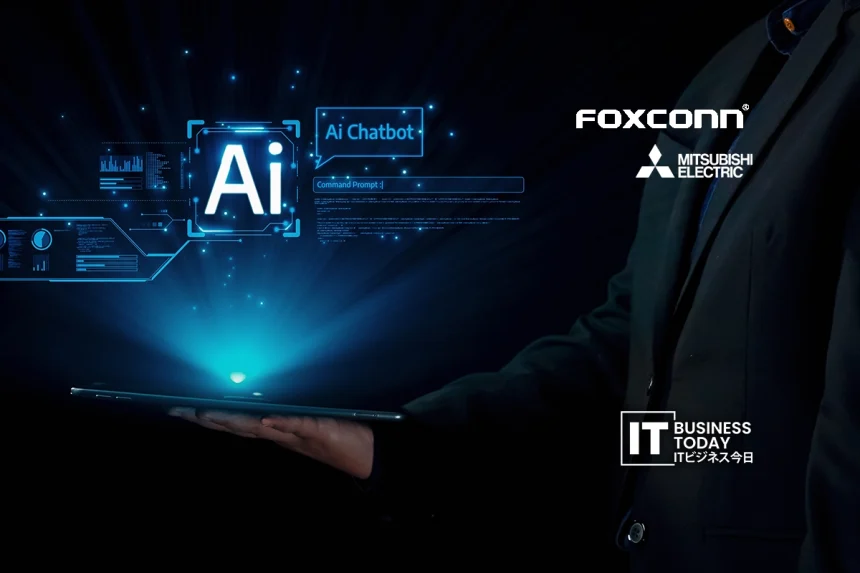Japanese industrial powerhouse Mitsubishi Electric Corporation announced on November 6, 2025 that it has signed a memorandum of understanding (MoU) with Taiwanese electronics giant Foxconn – otherwise known as Hon Hai Precision Industry – to jointly develop, manufacture and supply energy-efficient, high-reliability infrastructure for AI data centers around the world.
The Deal in Brief
Under the MoU, Foxconn and Mitsubishi Electric will team up to provide AI data-center solutions while combining their respective strengths: Foxconn’s scale in electronics manufacturing and system integration, with Mitsubishi’s expertise in digital engineering, power-systems, and infrastructure for optimized energy efficiency, operational reliability, and circular economy.
The collaboration is poised to address growing global demand for AI compute infrastructure, particularly data centers that will support generative AI, large-scale inference, and edge computing.
Also Read: Canva Unveils ‘Creative OS’ to Unite Design and Marketing
Beyond data centers, the two companies said they would seek out new business models and sustainability-oriented applications using their combined technologies to go beyond conventional infrastructure markets.
Why This Matters for Japan’s Technology Industry
On the surface, this MoU is just a strategic partnership in AI infrastructure, but the deeper ramifications for Japan’s tech sector are quite significant.
Re-asserting Japan’s role in AI infrastructure supply-chains
Japan has traditionally excelled in manufacturing power systems, industrial equipment, and precision electronics. As data-center infrastructure rapidly becomes a crucial battleground-not just about energy use, cooling, modularity, and efficiency-this puts Japanese companies in an enviable position to become key players, not just component suppliers but system integrators for global AI infrastructure.
Elevating hardware-plus-software business models
The new generation of data centres requires not just mechanical and electrical engineering, but sophisticated software as well: monitoring, orchestration, AI-ops, and lifecycle services based on modular thermal/cooling design. In the case of Japan’s technology companies, that means a shift from pure manufacturing toward integrated systems and services, a trend under way but underscored by this deal.
Tapping into sustainability and ESG credentials
These needs tap directly into ESG demands as data-center operators come under increasing pressure globally to reduce energy consumption and carbon footprint. Japanese companies adopting and co-developing these solutions can carry this strong sustainability narrative, now increasingly relevant for global customers.
Enhancing exports and international cooperation
Japanese-led infrastructure solutions have a path for wider export through Foxconn’s global manufacturing and logistical scale. That offers potential access to Japanese tech firms to international markets at scale, more than only domestic or regional sales. It also opens up more cross-border collaboration and supply-chain integration.
Effects on Businesses Operating in this Industry
The MoU will ripple across several segments in Japan’s tech ecosystem:
Infrastructure equipment manufacturers
Japanese producers of power supply systems, cooling modules, data-hall structuring, and servers will find new demand for “AI‐optimized” versions to meet efficiency and reliability requirements.
Software and services firms
With infrastructure becoming smarter, the need for monitoring software, predictive maintenance, and data-center orchestration platforms will increase. Japanese software vendors and systems integrators can use this trend as a way to move up the value chain.
Startups and component suppliers
As data-center demands grow, the niche players in areas such as thermal management, smart power distribution, and modular container design all have a new growth vector. Key partnerships or supplier relationships with bigger firms like Mitsubishi Electric and Foxconn will hasten this process.
Energy and telecom operators
Accordingly, with locally available advanced infrastructure, Japanese telecommunications, cloud providers, and data centre operators will benefit. Early adoption of such solutions by Japanese firms will make them more competitive both domestically and abroad.
Global manufacturing and export businesses
Japanese equipment vendors and system integrators that align with this partnership could see increased export opportunity. The alliance signals a shift in where global infrastructure investment is headed—and Japanese firms are positioned to capture it.
Strategic Considerations & Challenges
While promising, the initiative also poses a number of strategic challenges for Japanese participants:
Ecosystem readiness Fully integrated AI-data-center infrastructure involves close coordination across manufacturing, software, services, cooling/thermal design, and global logistics; Japanese firms have to make sure they are sufficiently agile to work at speed.
Margin pressure and competition AI infrastructure is extremely competitive worldwide, with many players – North America, China, and Korea. Japanese companies have to provide clear differentiators: reliability, efficiency, sustainability.
Scaling service business internationally Traditionally, many Japanese firms have focused domestically. Global expansion, through Foxconn’s channels or otherwise, would require local support, maintenance capability, and servicing beyond the point of first sale.
Supply-chain and localization risks The complex nature of global data-center infrastructure means that supply chain resilience, local regulatory compliance in host countries, export controls, and geopolitical risks all have to be managed carefully.
Conclusion
The MoU between Mitsubishi Electric and Foxconn to develop AI data center infrastructure represents a milestone for Japan’s technology industry. It is symbolic of the shift from pure manufacturing strength into the high-growth realm of AI infrastructure-something that will be made up of systems demanding hardware, software, services, and global deployment. For Japanese technology businesses, this deal opens up new horizons in terms of growth in exports, evolution of business models, stronger alignment with global ESG trends, and participation in the next generation of infrastructure. The firms that adapt well and execute the tasks at hand could shape how data centers function on the global stage-and Japan’s tech industry could be central to that future.







